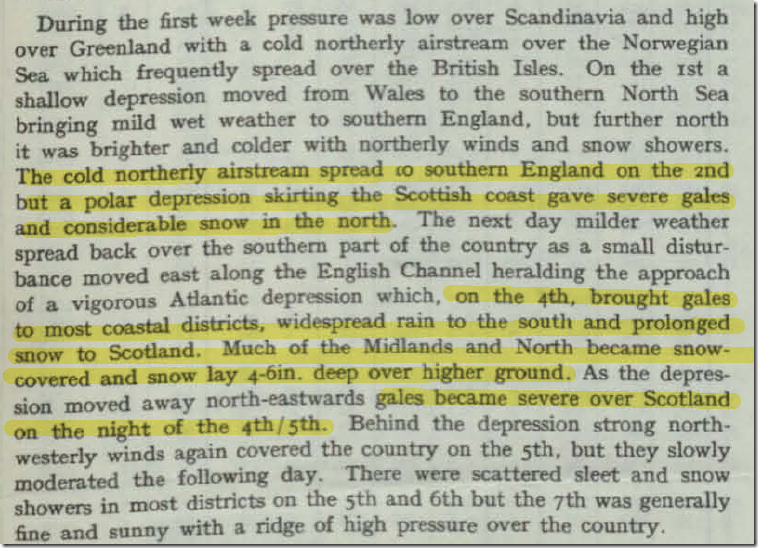Decembers 1961 & 1971
By Paul Homewood
December 1961 can be summed up in two words – cold and snow. The month was the 9th coldest on record since 1884.
The first week saw widespread snow and severe gales, whilst the Christmas week was one of the coldest of the century, with more heavy snow:
In total contrast, December 1971 was very mild. The UK mean temperature was 6.0C, higher than the preceding month, It was also higher than December 2021, which clocked 5.3C.
Temperatures were particularly above average in Scotland, where it is still the second warmest December on record behind 1988.
Top temperature was 16.3C at Colwyn Bay, just below the 16.5C clocked last month:
https://digital.nmla.metoffice.gov.uk/SO_7498a04d-6a40-4207-a27f-772663ffd2fc/
In this monthly lookback through the archives, two things are abundantly clear for every month we have checked:
1) Weather was every bit as extreme in the past
2) The weather can vary enormously from one year to another. This can not be better exemplified than the series for December, which has offered up very mild months to very cold ones, very dry ones to very wet, and very snowy ones to very little snow.
Comments are closed.







I love these reminders of life in the real world that is Planet Earth. You remind us all that the more things change . . . the more they stay the same. Weather is NOT stable !
As it is with Climate Change, cycles ARE the norm. Brian Fagan in his two publications brings us down to earth ‘The Great Warming’ and ‘The Little Ice Age’ where the day to day lives of real people are witnessed first hand.
Nature throughout The Holocene has delivered 18 major cycles. 9 Cooling Periods followed by 9 Warming periods . . . Today we are at the mid point of a warming trend that may well go on for another 150 years . . . Nobody knows . . . but change will come . . as is the norm.
https://www.academia.edu/49421861/CO2_Cradle_of_Life_on_Planet_Earth
https://www.academia.edu/51184433/Climate_Change_For_the_21_st_Century
The wide and frequent variations in UK weather are the reason why Brits are world renowned for talking about the weather. The beauty of being a small island between east and west weather systems.
Over Christmas, I re-read Brian Fagan’s little opus;
‘A modern European transported to the height of the Little Ice Age would not find the climate very different, even if the winters were sometimes colder than today and summers very warm on occasion. There was never a monolithic deep freeze, rather a climatic seesaw that swung constantly backwards and forwards, in volatile and sometimes disastrous shifts. There were artic winters, blazing summers, serious droughts, torrential rain years, often bountiful harvests and long periods of mild winters and warm summers. Cycles of excessive cold and unusual rainfall could last a decade, a few years or just a single season. The pendulum of climate change rarely paused for more than a generation.’
‘The Little Ice Age’ Brian Fagan, Basic Books, 2000
A splendid appraisal, full of common sense and accurate portrayal of the history. If we accept that the Little Ice Age occurred, that it was global in extent, we are left with the unavoidable question – what caused it? Or must we accept that it merely demonstrates the inherent variability of a highly non-linear system whose underlying mechanisms we still do not fully comprehend?
The singular fact is that it appears to have coincided with a period of low solar activity is the only real smoking gun available. And, the extreme weather variability noted by Brian at the onset of the LIA, seems to be replicated in the present data – now claimed to be caused by the singular parameter of CO2 in the atmosphere, on the basis of computer models based on linear algebra.
But CO2 was much lower, from the 13th to the 18th century, yet variability was very similar. So, claims of a causal influence are dubious at best. Brian Fagan merely adds CO2 as one parameter in a constellation of many – this is good sense. ‘Electroverse’ and others return the Sun to the position of primary mover – which from the point of view of the underlying physics, makes further good sense.
Paul’s excellent surveys of the available historical data show that there is little demonstrative data for a rapid and catastrophic change in ‘climate’. Indeed, both Brian Fagan’s and Paul’s work show that ‘climate’ as the end result of an assumed ‘steady state’ is a delusion. There may be periods and areas of relative weather-related calm embedded in weather time series, but they are part of the normal part of the structure of what we call ‘weather’ – a manifestation of a highly non-linear physical system!
Exactly !
‘The weather can vary enormously from one year to another.’
And which parts of the land get which variations can also be very variable.
Exactly, which is why it’s so easy to have record weather in the UK if you are looking at very small geographical areas. I suspect very few records are actually records if you increase the area under measurement only very slightly
I was born at home in London in the early January of 1962 and there were 6′ snow drifts partially blocking the road outside.
Just for a little more input . .
.
About 62,000 to 65,000 years ago there was land that connected Ireland, England and France called Doggerland. Think about it, walking to Ireland from France and never treading water. Scientists found that ancient people used to live and farm this area. As the ice melted Doggerland slowly sank beneath the sea like Atlantis.
So that boat about vanishing coastlines sailed about 62,000 years ago.
This study Rewrites the History of an Ancient Land Bridge Between Britain and Europe
New research suggests that climate change during The Little Ice Age, not a tsunami, doomed the now-submerged territory of Doggerland
https://www.smithsonianmag.com/smart-news/tiny-islands-survived-tsunami-almost-separated-britain-europe-study-finds-180976430/